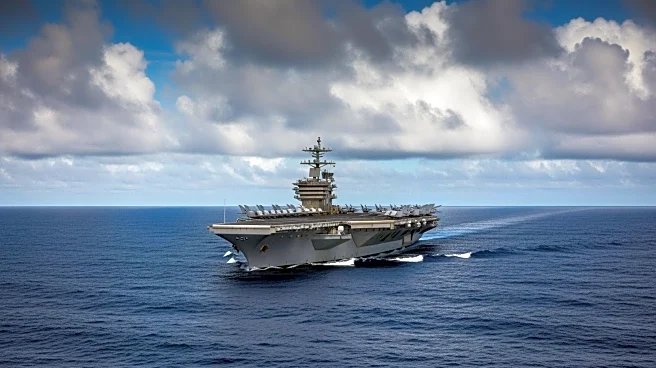What's Happening?
President Trump has ordered the deployment of the USS Gerald R. Ford, the U.S.'s most advanced aircraft carrier, to South America as part of a campaign against drug cartels. This move leaves the Mediterranean and Middle East without U.S. aircraft carrier coverage,
a significant shift given recent military engagements in these regions. The decision comes amid a fragile ceasefire between Israel and Hamas, and follows intense U.S. military operations in the Red Sea against Yemen's Houthi rebels. The deployment underscores a strategic pivot towards the Western Hemisphere, with the U.S. military increasing its presence near Venezuela. This includes 13 fatal strikes on alleged drug boats, raising concerns about potential U.S. intentions to destabilize Venezuelan President Nicolás Maduro's regime.
Why It's Important?
The redeployment of the USS Gerald R. Ford highlights a shift in U.S. military priorities, potentially affecting geopolitical stability in the Middle East and Europe. The absence of U.S. carriers in these regions could embolden adversaries and complicate peace efforts, particularly in the eastern Mediterranean. The increased U.S. military presence in South America, particularly near Venezuela, signals a heightened focus on countering drug trafficking. This move could escalate tensions with Venezuela, where President Maduro accuses the U.S. of fabricating a narrative to justify military action. The situation poses risks of regional instability, with potential implications for U.S. foreign policy and international relations.
What's Next?
The U.S. military's actions in South America may lead to further diplomatic tensions with Venezuela and other regional actors. The potential for land strikes in Venezuela, as suggested by Senator Lindsey Graham, could escalate the situation, leading to broader conflict. The U.S. Congress may seek to assert its authority over military actions, given concerns about the lack of congressional approval for recent strikes. The international community will likely monitor the situation closely, as any destabilization in Venezuela could have far-reaching consequences, including humanitarian crises and increased migration.
Beyond the Headlines
The strategic redeployment of U.S. military assets reflects broader shifts in global power dynamics and U.S. foreign policy under President Trump. The focus on drug cartels as unlawful combatants raises legal and ethical questions about the use of military force in non-traditional conflicts. The situation in Venezuela could serve as a test case for U.S. military engagement in the region, potentially setting precedents for future interventions. The implications for U.S. relations with Latin American countries and the potential for increased anti-American sentiment in the region are significant considerations.














